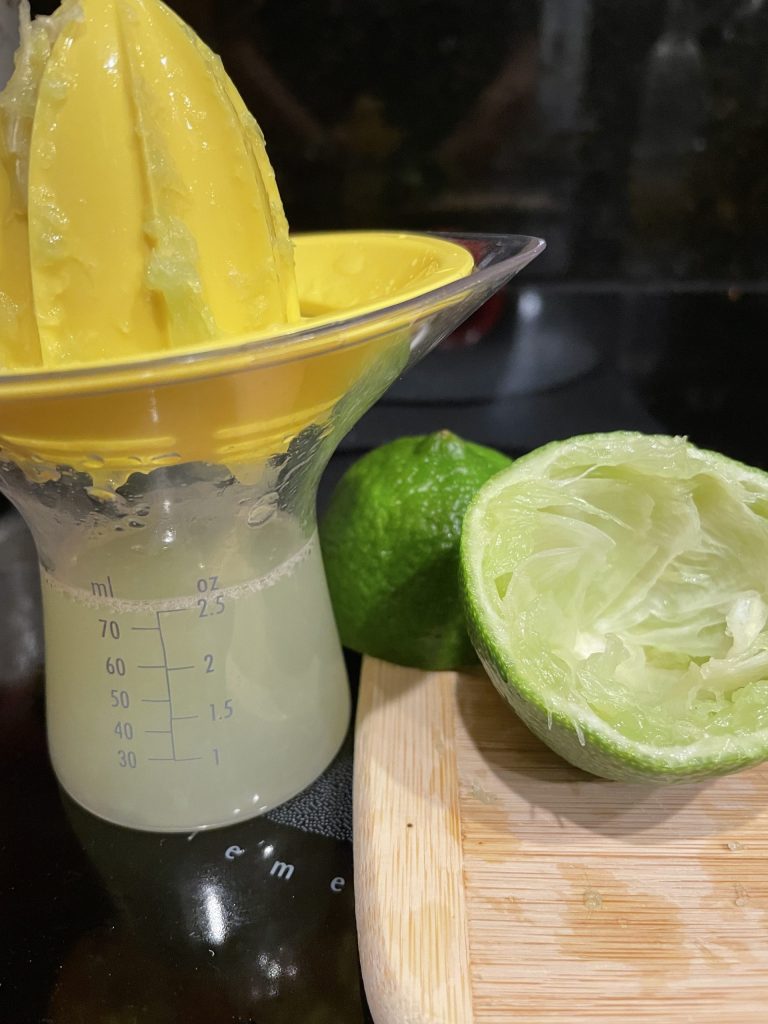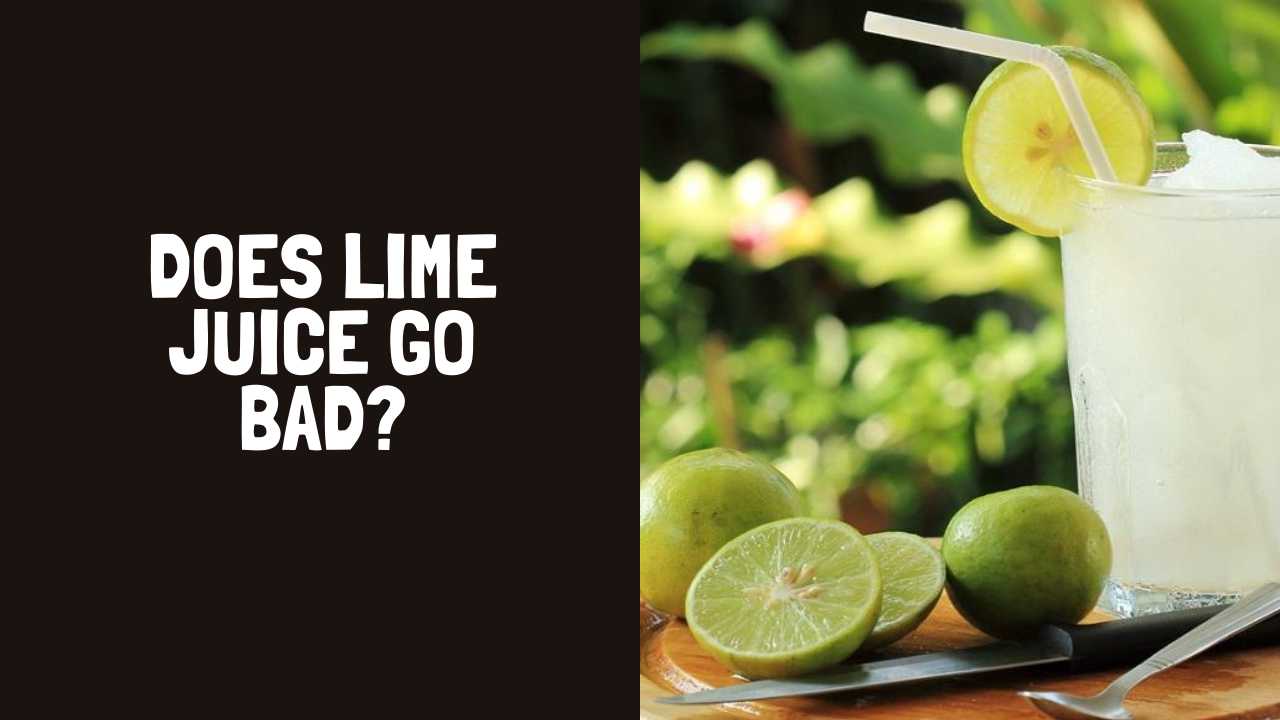Regarding zesty and refreshing flavours, It is a kitchen staple that adds a tangy twist to countless dishes and drinks. But can lime juice go bad over time? In this article, we’ll delve into the longevity of this citrus delight, examining its shelf life, storage tips, and signs of spoilage.
Whether you’re a culinary enthusiast or just an occasional lime juice user, understanding how to handle and store it properly can make a significant difference in maintaining its freshness and flavour. So, let’s squeeze out the facts and answer the question: Can lime juice go wrong?
Does Lime Juice Go Bad?

Yes, It can go wrong. Like any other fruit juice, It is perishable and will eventually spoil if not stored properly. Factors such as exposure to air, light, heat, and bacteria can contribute to the deterioration over time. Signs of spoilage include a change in colour, an off-putting odour, and mould or yeast growth. It is essential to check the expiration date on the bottle or container and follow proper storage guidelines to ensure the freshness and safety of lime juice.
How Long Does Fresh Squeezed Juice From Limes Last?
Freshly squeezed juice from limes typically lasts 2-3 days when stored properly in the refrigerator. However, it is essential to note that the quality and taste of the juice may start to deteriorate after the first day. Consuming the juice as soon as possible is recommended to enjoy its optimal flavour and nutritional benefits.
Shelf Life Of Lime Juice
Here are the key points about the shelf life of lime juice:
- Properly stored, it can last 3-4 months in the refrigerator. The fridge helps slow down enzymes and microbial growth that cause spoilage.
- Pasteurized lime juice sold in bottles typically has a 9-12-month shelf life in the fridge once opened. The pasteurization process kills any pathogens and extends its usability.
- Unpasteurized fresh has a shelf life of only 1-2 weeks in the fridge. Without pasteurization, it spoils faster due to the presence of microbes.
- Freeze to increase its shelf life to 6-8 months. Freezing halts microbial activity and enzymatic reactions that degrade quality.
- When freezing, leave 1/2 inch of headspace in sealed containers to prevent bursting during expansion from ice crystals.
- Signs of spoiled lime juice include mould growth, slimy or stringy texture, and an unpleasant sour or yeasty smell. Discard if you notice any of these changes.
- For maximum freshness, consume fresh lime juice within 3-4 days of squeezing the limes, or use pasteurized bottled juice for more extended storage.
So, in summary, properly stored, it keeps best in the fridge or freezer, with pasteurized varieties maintaining peak quality for 9-12 months when refrigerated. Fresh juice only lasts 1-2 weeks.
How Do You Know If Lime Juice Is Bad?
Lime juice, like any other food or beverage, can go bad over time. A few indicators can help you determine if it has gone wrong. It is essential to pay attention to these signs to ensure that you consume fresh and safe lime juice.
Expiration date
The first thing to check is the expiration date on the bottle or container of lime juice. This date indicates the recommended period for consuming the product at its best quality. If it has passed its expiration date, it is advisable to discard it.
Appearance
Visually inspect the changes in colour or texture. Fresh, it should have a clear, pale yellow or greenish colour. If you notice any discolouration, such as a darker or cloudy appearance, it may indicate that the juice has spoiled.
Smell
Take a whiff of the lime juice. Fresh, it has a distinct citrusy aroma. If you detect any off-putting or foul smell, it could be a sign of spoilage. A rotten or fermented odour suggests that the lime juice has gone wrong.
Taste
If you need more clarification about the freshness, you can take a small sip to assess its taste. Fresh lime juice should have a tangy and refreshing flavour. If it tastes sour, bitter, or unpleasant in any way, it is likely spoiled and should not be consumed.
Mould or growth
Inspect the bottle or container for any signs of mould or growth. Mold can develop on the surface of spoiled lime juice, especially if it has been exposed to air or stored improperly. Discard them immediately if you notice any mould or unusual growth.
How Long Does Lime Juice Last?
The shelf life of lime juice depends on various factors, such as whether it’s freshly squeezed or commercially processed, how it’s stored, and if any preservatives are added. Here are some general guidelines:
Freshly Squeezed Lime Juice:
Refrigerated Freshly squeezed lime juice can last about 2 weeks when stored in the refrigerator.
Freezing:
You can extend the shelf life by freezing it. Frozen lime juice can last for several months.
Commercially Processed Lime Juice:
Unopened: If it’s in a sealed, unopened bottle, it can last for a long time, often up to a year or more, depending on the packaging and preservatives used.
Refrigerated after opening:
It’s best to store it in the refrigerator and use it within a few weeks or months. Check the label for specific guidance.
Preservatives:
Lime juice with added preservatives may have a longer shelf life. Check the product label for information on preservatives.
Signs of Spoilage:
Discard lime juice if it develops an off smell, unusual colour, or mould. Changes in taste and the appearance of sediment may also indicate spoilage.
Remember that these are general guidelines, and the shelf life can vary based on specific brands, storage conditions, and other factors. Always check the product label for manufacturer recommendations regarding storage and shelf life. If in doubt, it’s safer to discard the lime juice if it’s past its prime to avoid any potential health risks.
Can You Use Expired Lime Juice?
Yes, it expired; it can still be flavoured but may have diminished flavour and quality. The expiration date on lime juice indicates when the product is freshest and most flavorful. However, it can still be used in recipes if the juice has been appropriately stored and shows no spoilaodours as mould or off-putting odours.
It is important to note that the taste and acidity of expired food may vary, so it is advisable to taste a small amount before using it in dishes. Additionally, if the juice has been opened and stored for an extended period, discarding it for safety is recommended.
Can You Get Sick From Old Lime Juice?
Yes, you can get sick from consuming old lime juice. When lime juice is left at room temperature for an extended period, it becomes susceptible to bacterial growth, particularly harmful bacteria like E. coli and Salmonella. These bacteria can caudiarrhoeaorne illnesses such as diarrhea, vomiting, and abdominal pain.
Additionally, high acidity may slow the growth of bacteria but does not eliminate the risk. Therefore, it is essential to store it properly in the refrigerator and consume it within a few days of opening to minimize the chances of getting sick.
Can You Freeze Lime Juice?
It can be frozen to extend its shelf life and preserve freshness. Freezing it can be a convenient way to have it readily available for future use, especially if you have an abundance of limes or need to store the juice for an extended period.
When properly frozen, It can maintain its flavour and nutritional value. It is important to note that freezing may cause some changes in texture and taste. Still, these alterations are generally minimal and do not significantly affect the overall quality of the juice.
How Long Can I Refrigerate Limes?
Limes can be refrigerated for up to two weeks without freezing procedures. It is essential to store them properly to maintain their freshness and flavour. To do so, place the limes in a plastic bag or airtight container and store them in the refrigerator’s crisper drawer. This will help to prevent moisture loss and maintain their juiciness. However, it is worth noting that the quality of limes may deteriorate over time, so it is best to use them within the first week for optimal taste and texture.
How To Properly Store Your Lime Juice?
Here are some guidelines on how to properly store your lime juice:
- Store in a clean, airtight container to prevent oxidation and maintain freshness
- Refrigerate lime juice at all times to slow down the growth of bacteria
- Avoid storing in metal containers as it can react with the acid and alter the taste
- Use glass or plastic containers specifically designed for food storage
- Ensure the container is tightly sealed to prevent air exposure
- Label the container with the date of extraction to keep track of freshness
- Store away from direct sunlight or heat sources to maintain quality
- Avoid storing lime juice for extended periods; it is best consumed within a few days
- If freezing, use freezer-safe containers and leave some headspace for expansion
- Thaw frozen the refrigerator before using
Conclusion
In conclusion, It cannot go well over time due to various factors such as exposure to air, light, and heat. The shelf life of lime juice depends on whether it is freshly squeezed or commercially packaged. However, once opened, it should be consumed within a week or two. Signs of lousy lime juice include colour, odour, and taste changes. It is essential to store it properly in a tightly sealed container in the refrigerator to maximize its shelf life and maintain its quality.
FAQs
How Do You Know If Limes Have Gone Bad?
There are two leading indicators to determine if limes have gone wrong: their appearance and smell. If the limes have become discoloured, mouldy, or have a slimy texture, they are likely spoiled.
Is It OK to Use Old Lime?
No, it is not recommended to use old lime as its effectiveness may be compromised over time.
How Long Can Lime Last In The Fridge?
Lime can last in the fridge for up to two flavours. However, its quality and flavour may need to improve in the first week.
Does Lime Juice Go Bad At Room Temperature?
Yes, It can go bad at room temperature due to its high acidity and vulnerability to bacterial growth.
Can You Freeze Lime Juice?
Yes, It can be frozen. Frozen in an airtight container or ice cube trays is recommended for easy portioning.

